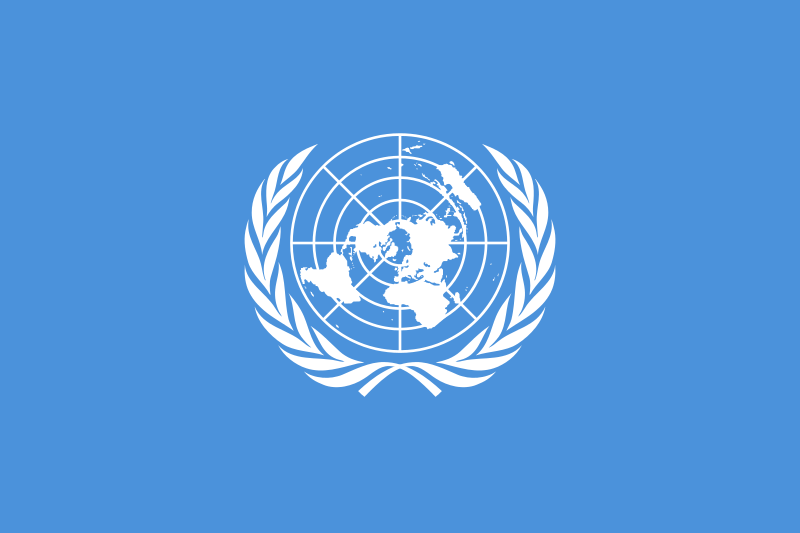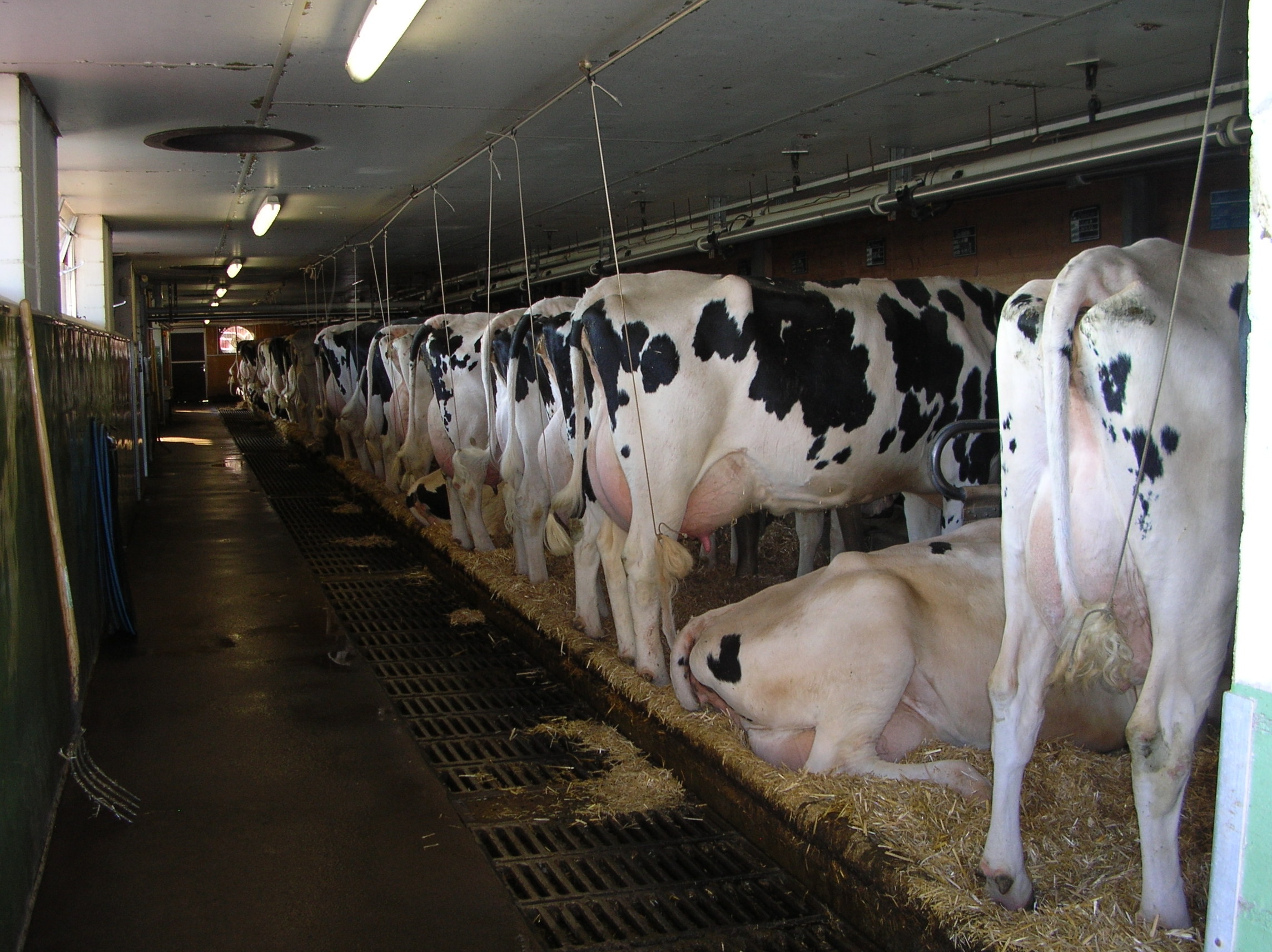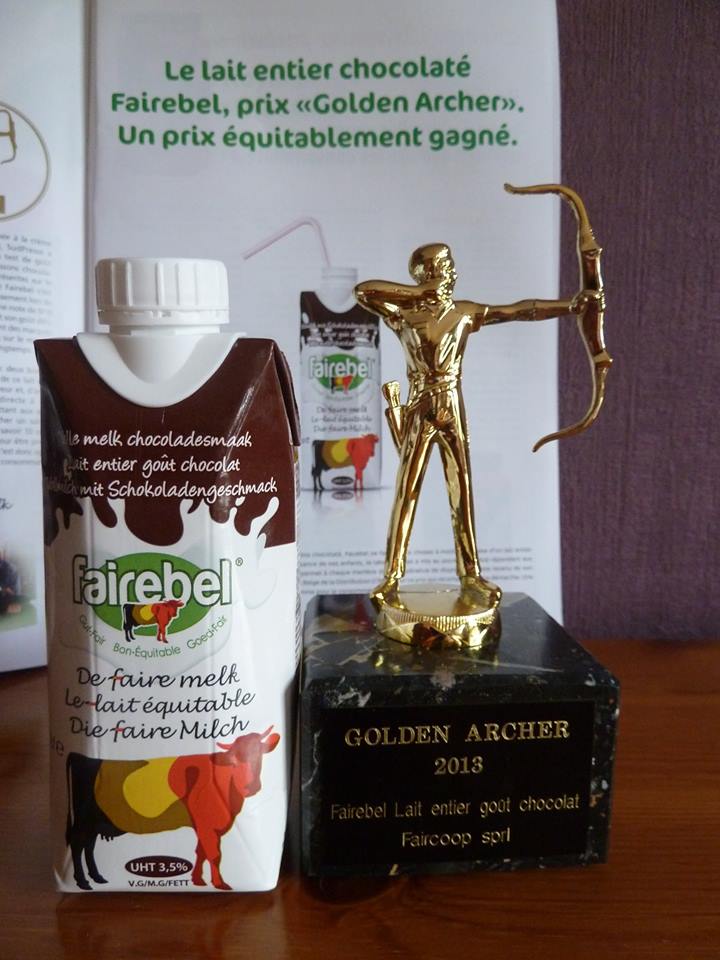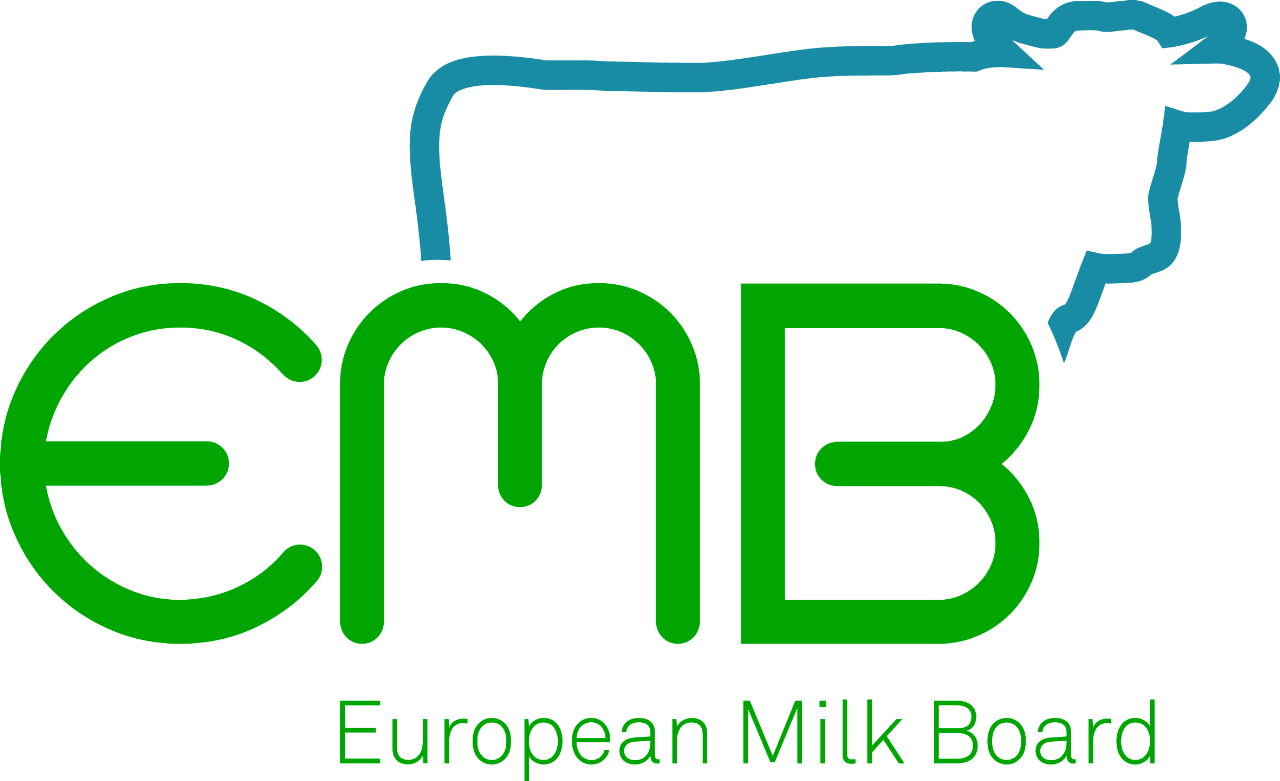EMB Newsletter April 2014
Newsletter as PDF
Contact
European Milk Board
Rue du Commerce 124
B-1000 Brussels
Phone: 0032/2808/1935
Fax: 0032/2808/8265
E-Mail: office@europeanmilkboard.org
Website: http://www.europeanmilkboard.org
Newsletter as PDF
Contact
EMB - European Milk Board asbl
Rue de la Loi 155
B-1040 Bruxelles
Phone: +32 - 2808 - 1935
Fax: +32 - 2808 - 8265
Dear Dairy Farmers and Interested Parties,
I would like to take this opportunity to think outside of the European milk policy for once and put the EMB’s political commitment in a wider context. At the end of last year I was invited by NGOs to visit Burkina Faso in West Africa, and was able to find out about the living conditions of the milk producers in this fascinating but sadly very poor country. I became convinced during the trip that despite the different standard of living in West Africa and Europe the dairy farmers’ problems are quite similar: in neither part of the world do producers receive fair pay for their work.
Korotoumou Gariko, a highly intelligent and politically committed dairy farmer graphically described this terrible situation. I met Korotoumou for the first time in Burkina Faso and last month returned the compliment by welcoming her to my farm in Belgium. She believes that cheap imports of milk powder from western industrialised countries are mainly to blame for small farms like hers with fifty-five animals being in difficulty and village structures being destroyed in her land. This is a clear indication that the growth ideology of the European dairy industry not only ignores the needs of farms in Europe but also has a severe impact on other continents. This is the flipside of the globally deregulated trade with dairy products sold to us time and again by our own politicians and representatives of the dairy industry as salvation and a concept for the future.
Given the scenario of hunger in Africa I also asked Korotoumou what she thought about our having thrown away milk in the fields in Europe during the big milk strike in 2009. She simply replied that she did just the same whenever she couldn’t sell her milk because prices were too low. One can of course only shake one’s head and think what madness it must be when farmers in Africa, where milk is even more precious than in Europe because production is much lower, resort to such desperate measures. And when farmers and people with such different cultural backgrounds as in Africa and Europe reach the same conclusion that it cannot go on like this, then something must be fundamentally wrong.
This realisation that we with our demands in Europe are not alone and are also struggling on behalf of milk producers in other continents, should therefore motivate us even more for our political work in the EMB. Our demands are currently being supported by a report published in March from the United Nation’s Special Rapporteur on the Right to Food, Olivier de Schutter. The report stresses that what rich countries will have to do in the future is abandon an export-oriented agricultural policy, leaving space for local smallholders in developing countries. An article in this issue of the EMB Newsletter summarises the key points made in the report.
Erwin Schöpges (Member of the EMB Board)
Travel report: Europe has to be experienced first-hand! German dairy farmers visit their counterparts in Italy and Switzerland.
Stefan Lehmann, member of the Board of the German EMB affiliate BDM, was delighted that a total of 102 dairy farmers had signed up for the BDM members’ trip to northern Italy. At short notice – but very gladly – Lehmann had to organise a second coach and a second hotel. On Friday, 7 March, at 1.30 in the morning the trippers set off from Zell am Harmersbach in southern Germany heading for Switzerland.
After the Gotthard Tunnel it became daylight and the sun was soon shining brightly on the snow-capped peaks of the Alps.
United Nations report: The world’s food systems need to be radically and democratically redesigned
The following press release was published on 10 March 2014 on the occasion of the publication of the final report of the UN Special Rapporteur on the right to food, Olivier De Schutter.
GENEVA – The United Nations Special Rapporteur on the right to food, Olivier De Schutter, today called for the world’s food systems to be radically and democratically redesigned to ensure the human right to adequate food and freedom from hunger. “The eradication of hunger and malnutrition is an achievable goal. However, it will not be enough to refine the logic of our food systems – it must instead be reversed,” Mr. De Schutter stressed during the presentation of his final report to the UN Human Rights Council after a six-year term as Special Rapporteur.
Update on milk market situation in Ireland
Utmost in the mind of dairy farmers in Ireland this spring is milk price and quota. Milk price paid to dairy farmers from dairy processors is currently 38 to 39 cents per litre. Based on estimated milk deliveries as submitted by milk purchasers for the period up to the end of February 2014, Ireland is 1.26% over quota when account is taken of the butterfat content of milk deliveries during that period.
Calving season is in full swing as most herds in Ireland are based on spring production systems.
New study results reveal shortfall in milk production
The following press release was published on 3 March 2014 on the occasion oft the quarterly updating oft he study on milk production costs in Germany:
(Brussels, 3rd March 2014) The new results of the cost study carried out by the German Office for Agriculture and Agricultural Sociology BAL show that the average price paid to dairy farmers in Germany in October 2013, i.e. 41,92 cents/kg, does not cover production costs. For the same period, production costs amounted to 44,12 cents/kg, thus revealing a gap of more than 2 cents per kilogramme.
The study, launched by the European Milk Board (EMB) and the German MEG Milch Board, also shows production costs according to three different regions.
Fair Milk in Belgium awarded prizes
This year the Fairebel chocolate milk from the product range of Fair Milk in Belgium was awarded one of the coveted Belgian Golden Archers in the “Fair Product” category. The prize is offered and awarded every year by the Belgian distribution organisation “Comité Royal Belge de la Distribution” and its trade publication “Vertrieb heute”. The Faircoop co-operative farmers who market Fair Milk in Belgium under the brand name Fairebel thus have an image-boosting success to announce that is encouraging for the further development of the project. The award ceremony was held on 21 March 2014 in Brussels.
Free trade in cheese – is it really a success story?
“Positive trade balance for Swiss cheese” says Swiss Cheese Marketing (SCM) in its latest press release on last year’s trade figures. Swiss cheese exports did indeed rise by 1.8 per cent in 2013. Yet there is another side to this coin: cheese imports went up 2.5 per cent in 2013.
Since the beginning of free trade in cheese with the EU in July 2007, not only have Swiss cheese exports abroad increased, but cheese imports have continually as well.
EMB Calendar
These are some of the EMB Board’s key dates in April 2014:
02.04.: Board meeting in Brussels
15./16.04.: General Assembly in Brussels
16.04.: Meeting with the EU Commission in Brussels on the monitoring agency for the EU milk market
Full Texts
Travel report: Europe has to be experienced first-hand! German dairy farmers visit their counterparts in Italy and Switzerland.
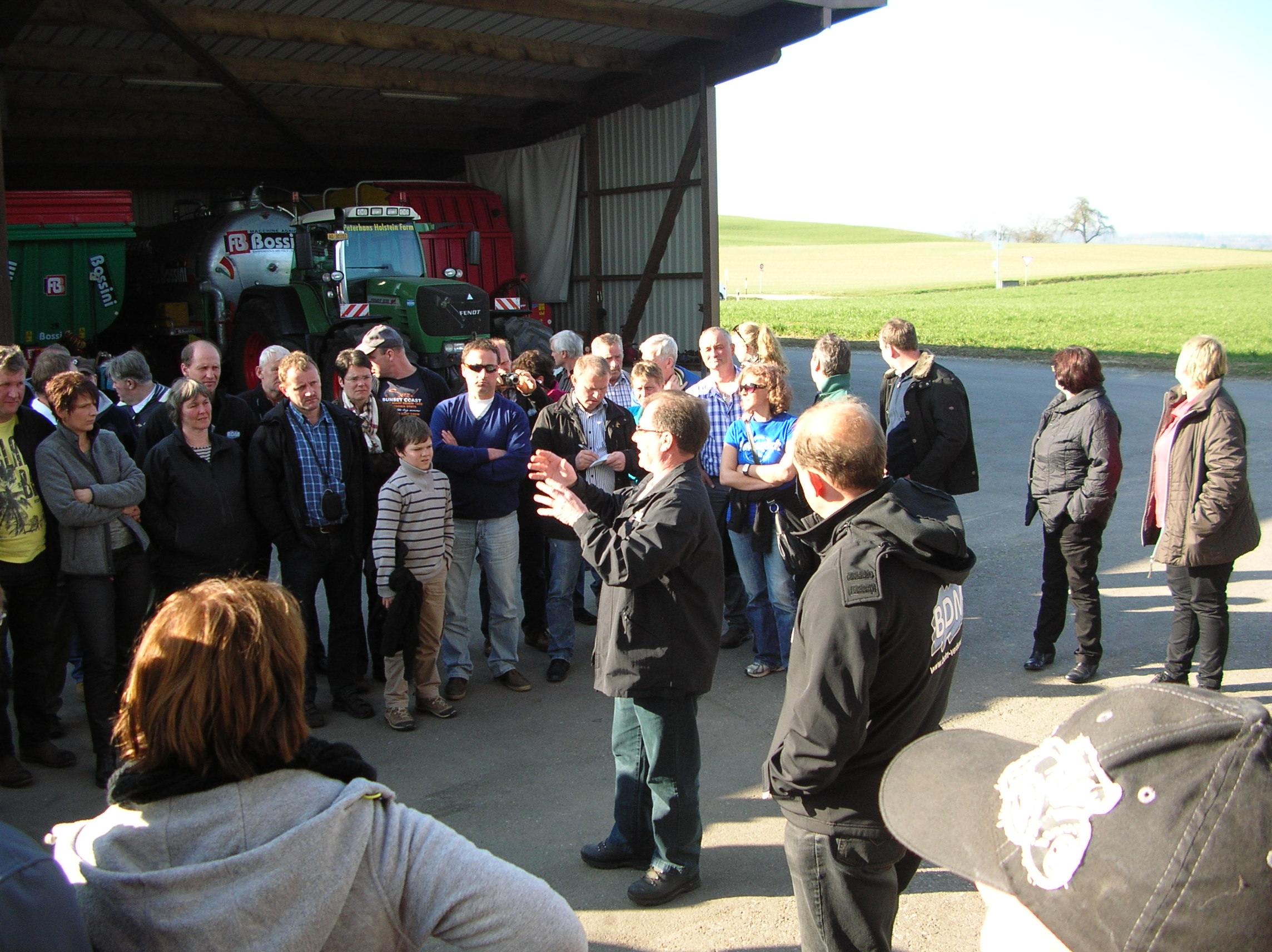
Stefan Lehmann, member of the Board of the German EMB affiliate BDM, was delighted that a total of 102 dairy farmers had signed up for the BDM members’ trip to northern Italy. At short notice – but very gladly – Lehmann had to organise a second coach and a second hotel. On Friday, 7 March, at 1.30 in the morning the trippers set off from Zell am Harmersbach in southern Germany heading for Switzerland.
After the Gotthard Tunnel it became daylight and the sun was soon shining brightly on the snow-capped peaks of the Alps. Just before 10 a.m. the travellers finally reached their first port of call: the Costa family farm in Offlaga, a municipality in the province of Brescia in Lombardy, about 40 km south of Lake Garda. The Costa family live in a square-shaped farmhouse that dates back to the 15th century and run a farm with 160 dairy cattle, 250 breeding sows and 26,000 chickens. According to the Costa family the only profit these days comes from the chickens, unfortunately.
After a visit to the farm and a snack we went on to our hotel in Desenzano del Garda, the largest town on Lake Garda with a population of about 27,000. We checked in and continued our journey to member of the EMB Board Roberto Cavaliere’s farm in Fenilazzo. Roberto Cavaliere and his two brothers manage a farm with about 120 dairy cattle, its own cheese dairy and its own winery. Roberto also makes his own ice-cream – in more than 100 different flavours. Roberto played the perfect host: the impressive tour was followed by an invitation to savour the original Italian pizza. The German dairy farmers could choose from 14 different toppings. An eventful first day ended in the late evening in a convivial atmosphere.
On Saturday the travelling party all headed for Venice to explore the world-famous historical city on a comprehensive guided tour. In the marvellous weather the city around the famous St. Mark’s Square was resplendent in all its beauty. The German dairy farmers were invited back to Roberto Cavaliere’s again in the evening. We spent some very pleasant hours together with Italian live music and a tasty barbecue.
On Sunday we took our leave from the beautiful region around Lake Garda, where spring was already in full bloom. The next stop was Switzerland. Passing Lake Lucerne and Lucerne itself we arrived at Toni Peterhans’s farm in the municipality of Fislisbach in the region of Baden in the Swiss canton of Aargau.
What the farmers saw there will no doubt remain long in their memories. With 41 cows producing an incredible stall average of 12,600 kg milk, as a real professional cattle breeder Toni Peterhans has not only almost the largest volume of milk in Switzerland but also the longest living cows in the country. What the German visitors also found remarkable was that all the cows were tethered – as is still the case with many farmers in the Black Forest. Another impressive feature was how clean were the animals, the stall and the whole farm with its large fleet of vehicles, which is necessary because Toni Peterhans runs a contracting business as a sideline.
After the three wonderful days, district team leader Stefan Lehmann thanked everyone for their great interest and also the great discipline that is important with such a large travelling group. In particular he thanked Markus Hafner, a colleague and friend from South Tyrol, who had organised everything perfectly on the spot and had made such a major contribution to the success of the three days with his excellent interpreting.
Everyone was agreed how important it was to meet and converse with other German and European dairy farmers. One quickly realises that the situation of dairy farmers is similar throughout Europe. At the same time one also feels that one is not alone in the common endeavour for a sustainable milk market that is not only for the benefit of the dairy farming families but also for the benefit of the population as a whole.
Many of those who went on the trip have already signed up for next year – even though the destination has not been decided on yet.
BDM district team Ortenau (Germany)

